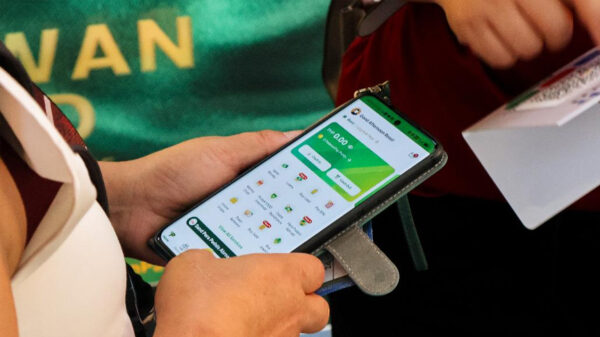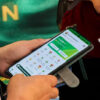Msgr. Julius Perpetuo S. Heruela is the parish priest of the St. Augustine of Hippo Parish in Bacong, Negros Oriental. Like a growing number of his fellow pastors in this largely Catholic country, he is holding “virtual masses” this Holy Week amid the COVID-19 pandemic which has made public gatherings in churches a serious health risk.
The parish priest livestreams his masses using a web cam linked to his laptop which is connected wirelessly to a PLDT Home Prepaid WiFi unit. He delivers the video to his parishioners via his Facebook page like a watch party. The whole set up runs on the 4G LTE service of Smart Communications. Heruela adds that nine other parishes in the Diocese of Dumaguete are holding online Masses in the same way.
“Before, Masses were just televised on national TV. Today, we can do it ourselves every day– within the parish and with our own parishioners – with the help of technology and fast connectivity,” said Msgr. Heruela.
“We’re very happy that we are able to help people observe Holy Week rites online amid quarantine conditions, said Alfredo S. Panlilio, Smart President and CEO and Chief Revenue Officer of PLDT.
“The case of Msgr. Heruela is particularly gratifying because he is doing it in Bacong, a 4th class municipality, about 650 kilometers south of Metro Manila. This shows that we have really made progress in expanding the reach of our high-speed LTE service to more and more areas of the country,” he added.
That was in fact the gist of the latest report on mobile connectivity in the Philippines by independent mobile analytics firm Opensignal. Released this week, that report said Smart remained ahead of competition in terms of Video Experience, Upload and Download Speed Experience, Voice App Experience and Games Experience.
But the striking difference was in 4G Availability.
“Smart broke away from Globe in the six months since our last report to take the 4G Availability award,” Opensignal said in its report available on its website. “[Smart] increased its 4G Availability ranking by 7.5 percentage points for a score of 81.8%, an increase over its score of 74.3% in our last report.”
Covering the period Nov. 1, 2019 to Jan. 29, 2020, this Opensignal report was based on 659,883,359 measurements from 288,492 devices. It also included a new metric called Games Experience, which measures how mobile users experience real-time multiplayer mobile gaming on an operator’s network. Smart is the first operator to be awarded this citation globally.
Opensignal also noted the increase in download speeds on Smart’s network. “Smart won this category with users experiencing an overall Download Speed of 10.6 Mbps, that is a 12.8% increase over the 9.4 Mbps speed that we reported last September. It was also 3 Mbps faster than its rival,” Opensignal said, adding that in terms of Upload Speed Experience, Smart’s score of 3.9 Mbps is better than the competitor’s score of 2 Mbps.
In terms of Video Experience, Smart posted a score of 55, well ahead of competition’s 39.8. “Smart’s score is a 15.6% increase over our last report when Smart achieved a rating of 47.6,” Opensignal said.
Smart posted these service quality improvements even though data traffic on its network has been growing rapidly over the past few years. In 2019, Smart’s mobile traffic jumped to 1.6 Exabytes – twice the volume in 2018 and four times that of 2017.
“We’ve managed to stay ahead of the growth of our data traffic by continuing to invest heavily in our network,” explained Mario G. Tamayo, senior vice president for Network Planning and Engineering for PLDT and Smart.
In 2019, Smart expanded its coverage and capacity further by increasing the number of its 4G/LTE stations by 51% to about 24,600, as well as its 3G base stations by about 19% to 13,800. As of end-December 2019, Smart’s mobile data service coverage reached 94% of the country’s population. This was supported by the expansion of PLDT’s fiber optic footprint by 32% to 322,400 kilometers, the country’s most extensive digital backbone and transport network.
“Of course, we had no idea that something like COVID-19 was coming. But, in a sense, our network expansion efforts were, shall we say, providential. At least, during this rather difficult period, we can help people come together in prayer to seek God’s blessings and help,” Panlilio said.
Opensignal Awards – Philippines: Mobile Network Experience Report April 2020, based on independent analysis of mobile measurements, was recorded during the period Nov. 1 – Jan. 29, 2020.









































































































